To get Section 8 housing for victims of human trafficking, there are several steps you need to follow. The first step is to contact your local HUD office. You can find the nearest office by visiting the HUD website or calling the toll-free number. Explain that you are a victim of human trafficking and need assistance with housing.
In this blog post, we’ll guide you through the process of getting Section 8 housing assistance as a victim of human trafficking. We’ll cover everything from eligibility requirements to finding your local HUD office, completing the application, and understanding your benefits.
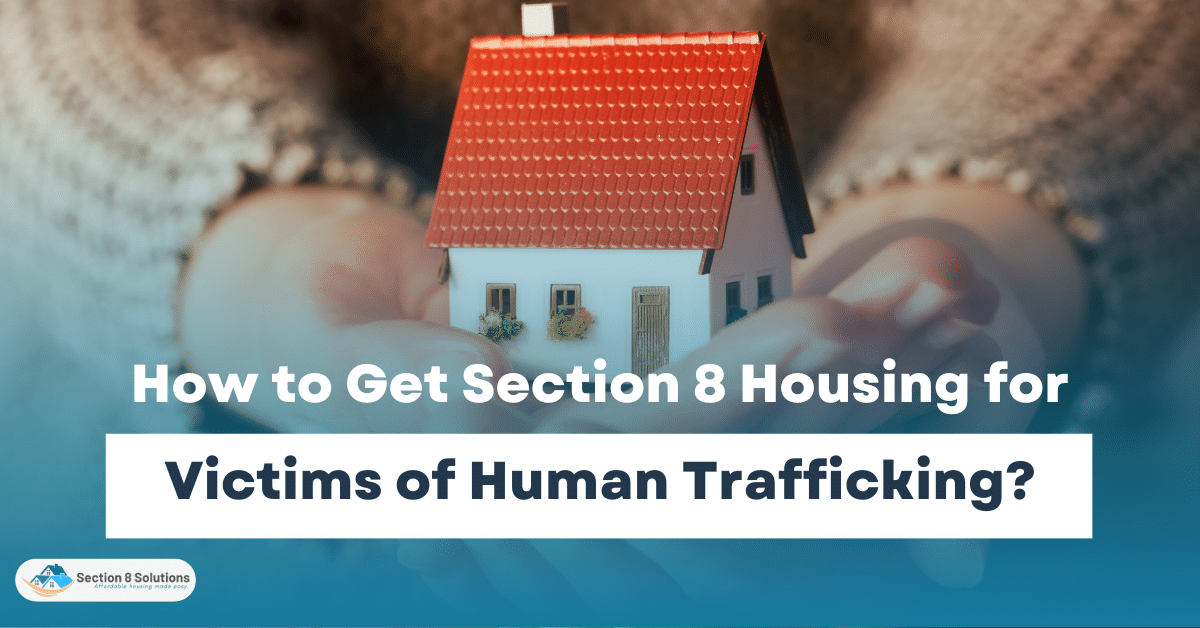
Eligibility Requirements for Section 8 Housing Assistance
To be eligible for Section 8 housing assistance, applicants must meet certain criteria set forth by the U.S. Department of Housing and Urban Development (HUD). These criteria include:
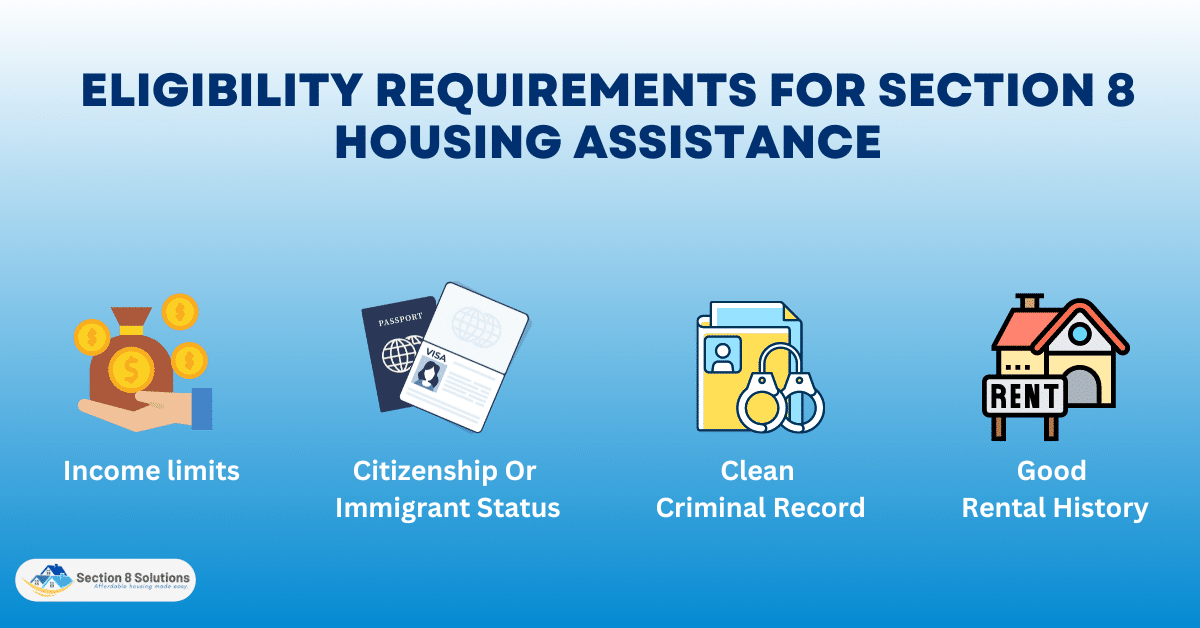
- Income limits: Section 8 housing assistance is intended for low-income individuals and families. Applicants must have an income that falls below a certain threshold based on the area in which they live.
- U.S. citizenship or eligible immigrant status: Applicants must be either U.S. citizens or eligible non-citizens, such as those with legal permanent resident status.
- Clean criminal record: Applicants with a criminal history may be ineligible for Section 8 housing assistance.
- Good rental history: Applicants must have a good rental history, with no recent evictions or outstanding debts owed to previous landlords.
In addition to these general eligibility requirements, victims of human trafficking may qualify for Section 8 housing assistance under a specific provision in the law. This provision states that victims of human trafficking are eligible for priority assistance, meaning that their applications will be processed more quickly and they will be given priority over other applicants.
Human Trafficking Victims Can Get Help
To qualify for priority assistance, victims of human trafficking must provide documentation of their status as a victim, such as a certification letter from a qualified professional such as a social worker or healthcare provider, or a court order. This documentation must clearly establish that the individual has been a victim of human trafficking.
Other types of documentation that may be required to prove eligibility for Section 8 housing assistance include proof of income, tax returns, birth certificates, and social security cards. Applicants may also be required to provide information about their current living situation, including the name and contact information of their current landlord.
By providing accurate and thorough documentation, victims of human trafficking can increase their chances of qualifying for Section 8 housing assistance and accessing the safe and secure housing they need to rebuild their lives.
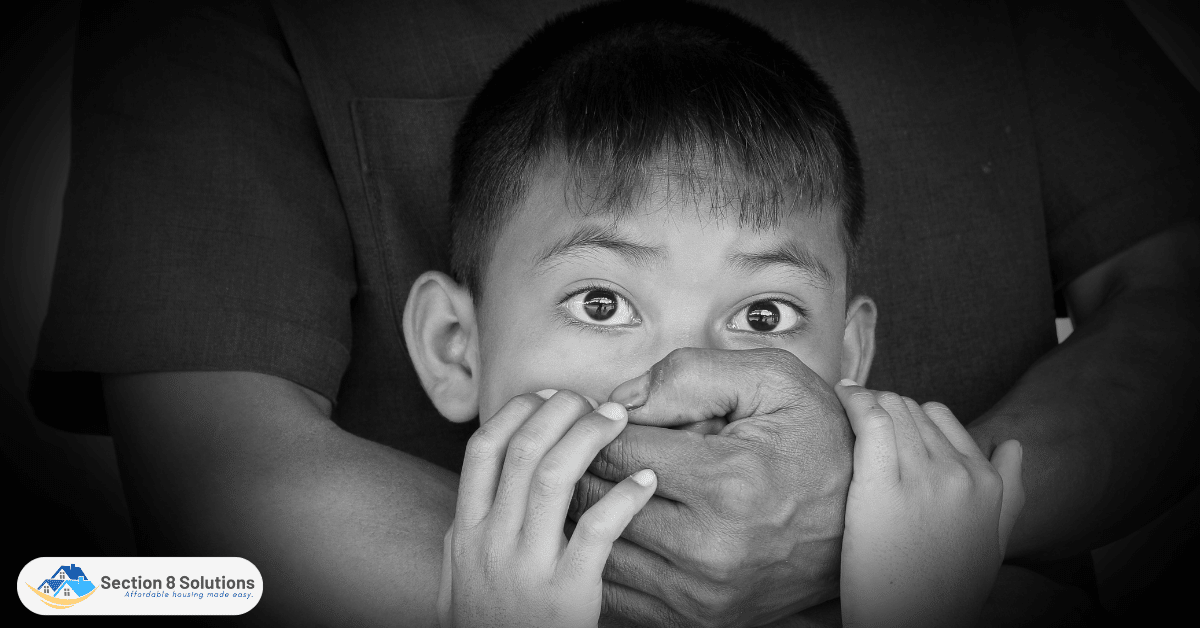
Finding and Contacting Your Local HUD Office
Locating your nearest HUD office is the first step in applying for Section 8 housing assistance as a victim of human trafficking. HUD has a website where you can search for your local office by entering your zip code. You can also call the HUD toll-free number at 1-800-569-4287 to find the office nearest to you.
After finding your local HUD office, you can make an appointment to apply. Callers may be requested for their name, address, and phone number. You may also be questioned if you are homeless or at risk of becoming homeless.
Bring proof of Section 8 eligibility to your HUD appointment. Your social security number, employment history, and income may be included. Police reports, court documents, or a letter from a social worker or healthcare provider certifying your status as a human trafficking victim are also required.
During your appointment, the HUD representative will review your application and determine your eligibility for Section 8 housing assistance. They will also provide you with information about the program, including the benefits you may be eligible for and the responsibilities you will have as a Section 8 housing recipient.

Completing the Section 8 Housing Assistance Application
Completing the application for Section 8 housing assistance can be a daunting task, but it’s an important step in accessing the safe and secure housing you need as a victim of human trafficking.
Here’s what you can expect during the application process:
- Review the application: Take the time to review the application thoroughly before you begin filling it out. Make sure you understand the questions and the information you will need to provide.
- Provide personal and financial information: The application will ask for personal and financial information, such as your social security number, employment history, and income information. Be sure to provide accurate and up-to-date information, as this will be used to determine your eligibility for Section 8 housing assistance.
- Provide documentation: You will need to provide documentation of your eligibility for Section 8 housing assistance, including documentation of your status as a victim of human trafficking. Make sure you have all of the required documentation before you begin filling out the application, and be sure to bring it with you when you submit your application.
- Answer questions honestly: It’s important to answer all questions on the application honestly and accurately. Providing false information can result in your application being denied or even in legal consequences.
- Seek help if needed: If you have difficulty understanding or completing the application, don’t hesitate to seek help. HUD offices often have staff members who can assist you with the application process.
When completing the application, it’s important to avoid common mistakes that can delay the processing of your application or result in it being denied.

Tips on How to Accurately and Honestly Complete the Application
To ensure that your application for Section 8 housing assistance is processed quickly and accurately, it’s important to avoid common mistakes that can delay the process or result in your application being denied. By following these tips, you can increase your chances of qualifying for Section 8 housing assistance and accessing the safe and secure housing you need as a victim of human trafficking.
1. Don’t Leave Questions Blank
When completing an application for Section 8 housing assistance, it is important to ensure that all questions are answered. Leaving questions blank can delay the processing of your application, or even result in your application being denied.
Even if you are not sure of the answer to a particular question, it is better to provide an answer to the best of your knowledge than to leave it blank. If a question doesn’t apply to you, it is important to indicate that on the application. You can do this by writing “N/A” or “not applicable” next to the question.
It is also important to note that some questions may require additional explanation or documentation. For example, if you are asked about your income, you may need to provide recent pay stubs or tax returns as proof. If you are unsure about what documentation is required, you can contact the HUD office for assistance.
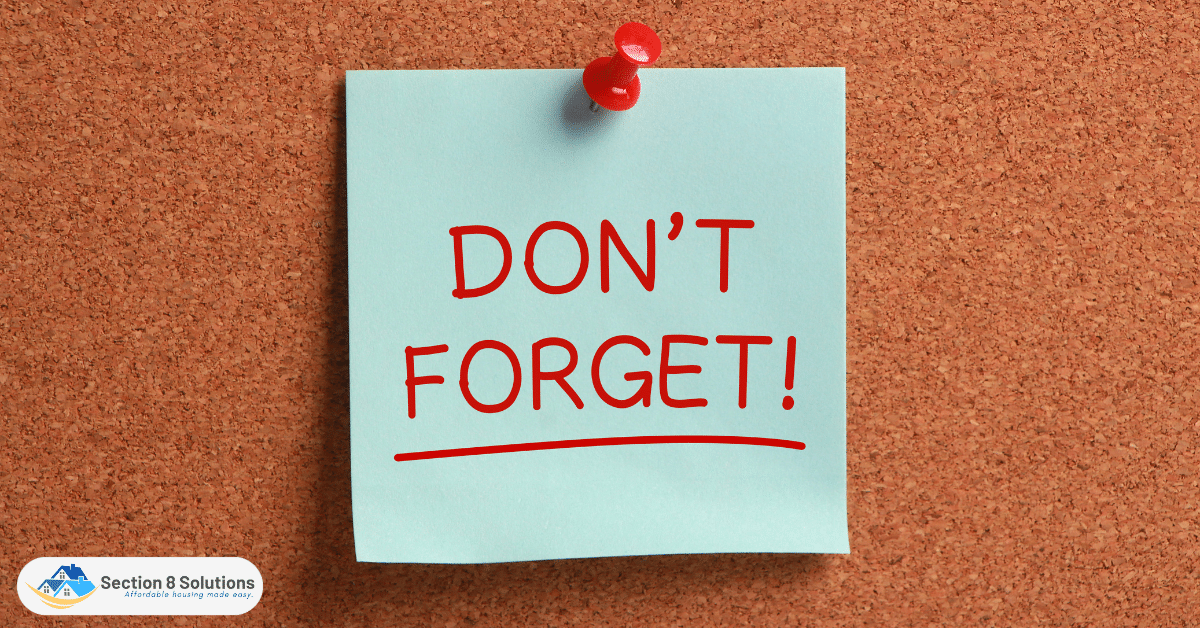
2. Don’t Provide False Information
When applying for Section 8 housing assistance, it is essential to provide truthful and accurate information on the application. Providing false information can not only lead to your application being denied but also result in legal consequences. It is important to understand that the information provided on the application will be verified by the housing authority, and any discrepancies or inaccuracies can result in the denial of benefits or even legal action.
In addition, it is crucial to report any changes in your income or family size to the housing authority promptly. Failure to report changes can result in an overpayment of benefits and, in some cases, may require repayment of the overage.
By providing truthful and accurate information and reporting changes promptly, you can ensure that you receive the benefits you are eligible for and avoid any legal consequences.

3. Don’t Forget to Sign and Date the Application
Signing and dating the application may seem like a small detail, but it is crucial to the application process. Without your signature, your application cannot be processed, delaying the assistance you need. Make sure to double-check that you have signed and dated the application before submitting it.
Remember, providing accurate information and following the application guidelines can help ensure that you qualify for Section 8 housing assistance and find safe and secure housing as a victim of human trafficking.
By accurately and honestly completing the application and providing all required documentation, you can increase your chances of qualifying for Section 8 housing assistance and accessing the safe and secure housing you need as a victim of human trafficking.

Waiting for a Response and Appealing a Denial
HUD may take weeks or months to respond to your Section 8 housing application. Stay patient and monitor your application status with the office during this period. Call or visit HUD to follow up. Call with your application number and other pertinent information.
The HUD office should be able to provide you with an estimated timeline for when you can expect a response. If your application is approved, you will be notified by mail and provided with information on how to proceed with finding and securing Section 8 housing. If your application is denied, you have the right to appeal the decision.
To appeal a refusal, you must submit a written request for an informal hearing to HUD within a certain date (usually within 10 to 30 days of receiving the denial). You can provide facts and advocate for your application at the hearing. If the informal hearing fails, you can request a formal hearing or submit a complaint to the U.S.
The HUD. To improve your appeal prospects, follow the appeal process and supply all relevant paperwork. After applying for Section 8 housing aid, follow up with the HUD office to verify the status of your application and be prepared to appeal the decision.

Understanding Your Section 8 Housing Assistance Benefits
Section 8 housing assistance is a vital resource for victims of human trafficking who need safe and secure housing. In this section, we’ll explore the benefits of Section 8 housing assistance and how it can help victims of human trafficking access the housing they need.
Benefits of Section 8 Housing Assistance:
1. Rental Subsidies
Rental subsidies are a key benefit of Section 8 housing assistance. This program provides eligible participants with financial assistance to help reduce their monthly rent payments, making it more affordable to live in safe and secure housing. The amount of the rental subsidy is based on a variety of factors, including your income, family size, and the cost of housing in your area.
To determine your rental subsidy, the HUD office will conduct an assessment of your household income and expenses. Based on this assessment, they will determine the portion of your monthly rent payment that is considered affordable for you, and provide a subsidy to cover the difference between that amount and the actual rent charged by the landlord.
The rental subsidy is paid directly to the landlord on behalf of the tenant, ensuring that the rent is paid in full and on time each month. This can be a significant benefit for victims of human trafficking who may be struggling to make ends meet or to find housing that fits within their budget.
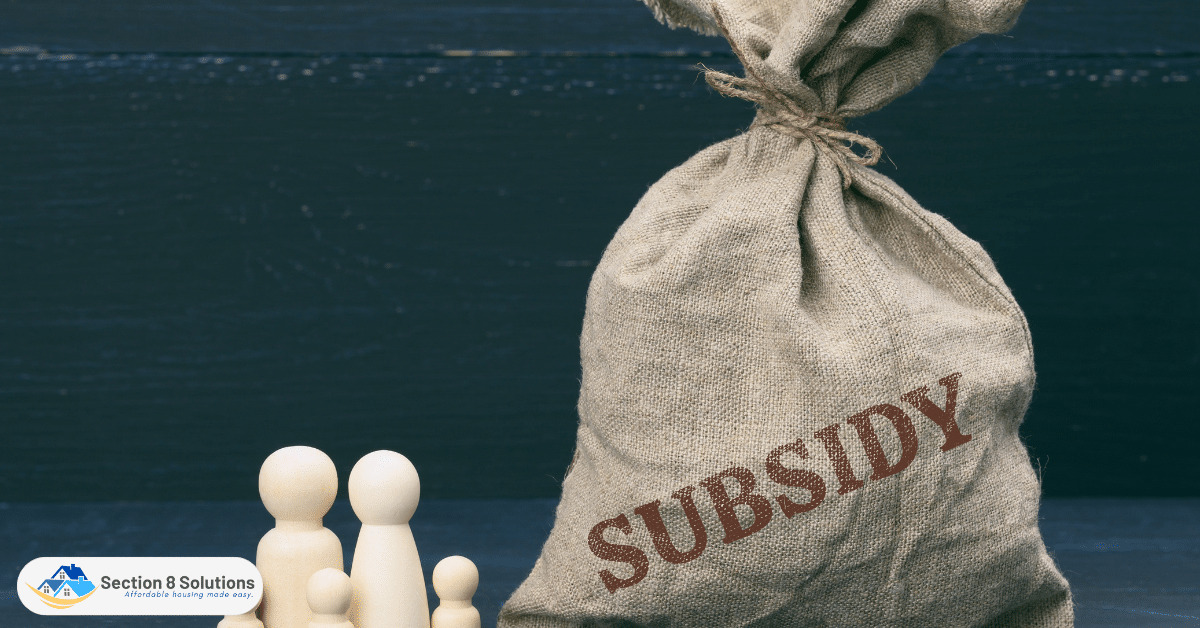
2. Financial Assistance
Section 8 housing help may cover security deposits, moving costs, and more. Human trafficking victims may struggle to afford safe housing due to these costs. Section 8 housing aid can reduce or eliminate these costs.
Security deposit aid helps reduce apartment rental prices. When moving in, many landlords demand renters pay a security deposit, which can be costly for struggling tenants. Section 8 housing assistance may cover all or part of your security deposit, making safe and secure housing easier to find.
Moving expenses can also be a significant financial burden for victims of human trafficking. Section 8 housing assistance may provide financial assistance for these expenses, including the cost of packing and moving your belongings, transportation costs, and related expenses.
Deposits for utilities, cleaning fees, and other moving expenses may be reimbursed under Section 8. Finding and moving into a new home can be expensive, but Section 8 housing assistance can help cover some or all of those costs.

3. Access to Safe and Secure Housing
Access to safe and secure housing is essential for victims of human trafficking, who often face significant risks to their safety and well-being. Section 8 housing assistance can help ensure that victims have access to housing that meets health and safety standards, providing peace of mind and protection from harm.
Housing that meets health and safety standards is essential for maintaining good health and well-being. Section 8 housing assistance requires landlords to comply with certain health and safety standards, ensuring that the housing provided is safe, clean, and in good condition. This includes requirements for working smoke detectors, proper ventilation, and safe electrical systems, among other things.
Human trafficking victims require stable homes too. Victims can reconstruct their life and gain independence in a safe and stable atmosphere. Victims can heal and recover in safe and secure housing.

4. Choice of Housing
Human trafficking victims can choose their own housing with Section 8 support. This could mean picking a housing unit that matches their mobility needs, is close to family or support networks, or has facilities they value.
Human trafficking victims, who may have suffered trauma and loss of control, need to pick their own residence. Section 8 housing assistance can empower victims by letting them choose their own residences.
Human trafficking victims may also benefit from choosing their own housing. Research shows that victims who have a say in their accommodation are more likely to stay in it long-term, be happier with it, and have better mental health.
Overall, the choice of housing offered through Section 8 housing assistance is an important benefit for victims of human trafficking, providing them with the opportunity to take control of their lives and rebuild their sense of agency and independence.

5. Protection Against Discrimination
Section 8 protects victims of human trafficking against landlord prejudice. Race, color, national origin, religion, sex, familial status, and disability are prohibited by the Fair Housing Act. Section 8 voucher recipients are discriminated against.
Human trafficking survivors are at a heightened risk of discrimination and stigma because of their past experiences. Section 8 housing assistance’s anti-discrimination protections can help guarantee victims have access to stable, discrimination-free living situations.
Human trafficking victims may receive legal rights and help under other federal and state statutes in addition to the Fair Housing Act. The Trafficking Victims Protection Act grants immigration relief, legal counsel, and case management to human trafficking victims.
Overall, the protection against discrimination provided by Section 8 housing assistance is an important benefit for victims of human trafficking, helping to ensure that they have access to safe and secure housing without fear of discrimination or mistreatment.
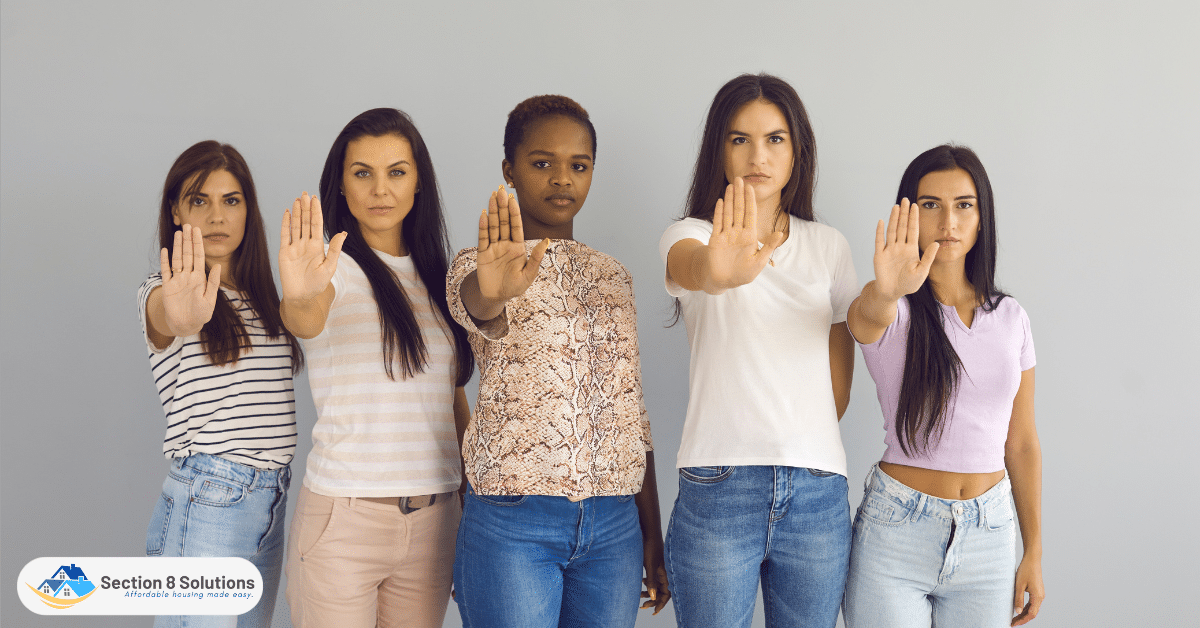
Additional Resources for Victims of Human Trafficking
In addition to Section 8 housing assistance, victims of human trafficking may be eligible for a range of other resources and support services to help them rebuild their lives and recover from the trauma of trafficking. These resources can include:
- Legal Aid: Human trafficking victims may receive free legal assistance for immigration, employment, and housing. The American Bar Association’s Committee on Domestic & Sexual Violence lists state legal assistance organizations.
- Counseling Services: Counseling and mental health treatments may assist human trafficking victims to cope with their suffering. The National Human Trafficking Hotline provides referrals to local counseling and support services.
- Healthcare Services: Human trafficking victims may need STI testing, mental health support, and physical damage. The Health Resources and Services Administration provides a directory of healthcare providers by state.
- Education and Training: Education and training programs may help human trafficking victims learn new skills and find work. The Department of Labor provides a directory of training and education programs by state.
- Financial Assistance: Human trafficking victims may receive financial aid for housing, food, and healthcare. The National Human Trafficking Hotline provides referrals to local financial assistance programs.
Human trafficking victims need these additional resources and support services to recover and move ahead. These resources give victims the assistance and services they need to heal. Links to organizations that help human trafficking victims are below:
- National Human Trafficking Hotline: 1-888-373-7888 or text HELP to 233733 (BEFREE)
- Polaris: https://polarisproject.org/
- National Human Trafficking Resource Center: https://humantraffickinghotline.org/
- U.S. Department of Homeland Security: https://www.dhs.gov/blue-campaign

Conclusion
Human trafficking victims require safe housing to restore their life. Section 8 housing assistance helps victims find inexpensive, safe homes. Victims should not hesitate to seek help. Human trafficking victims can get help by following this guide and working with the HUD office.
Additionally, it is important to remember that there are other resources available, such as legal aid and counseling services, that can provide additional support during this difficult time. We encourage readers to share this information with others who may be in need of assistance. Together, we can help victims of human trafficking find the safe and secure housing they deserve.












